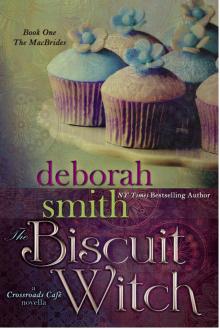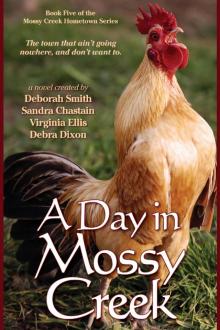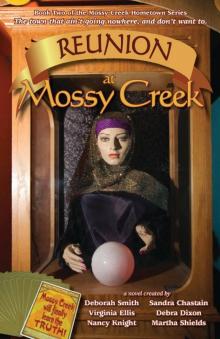- Home
- Deborah Smith
Miracle Page 5
Miracle Read online
Page 5
Smiling thinly, he went upstairs to the Cardiac Critical Care Unit and entered a row of glass cubicles. An eight-year-old boy had been brought in the day before suffering complications from open-heart surgery to correct a congenital defect. Electrodes were taped to his pale skin. Tubes carried various medications directly into the veins in the boy’s spindly arms. The clear tube that drained the child’s catheter dangled from one side of the bed. Around him various machines beeped and gurgled and clicked.
Sebastien got the child’s chart and went into his cubicle. He glanced at the boy without saying hello then began reading. Working with children was very difficult. He had a troublesome soft spot for anyone who was young and defenseless, because he remembered his own forced maturity. Annette and Jacques, so many years younger than he, had nicknamed him le général. He had disobeyed their father at every turn and caused many family uproars by spending his summers with their mother’s rough-hewn people, working the sardine boats along the Brittany coast.
When he finished with the chart he bent over the boy’s thin body and carefully put his stethoscope against the frail chest, where a thick strip of gauze covered the long incision left by surgery. The defect, a hole between the upper chambers of the heart, should have been repaired when the child was a baby. The boy had never been healthy.
“My name’s Tom,” the youngster murmured. The oxygen tube in his nostrils made his voice stuffy. “I just got transferred here from Florida. My grandma got skeered that I was goin’ to die.”
His attention tuned to the weak sounds of the recuperating heart, Sebastien merely nodded. He was vaguely aware the boy had brown hair and large blue eyes, and a photograph of him grinning beside a run-down farmhouse was taped to one glass wall of the enclosure. Sebastien didn’t want to notice more.
Tom did not intend to be ignored, apparently. “What’s your name?”
“Dr. de Savin.”
“Are you gonna be around a lot?”
“For now. I’m one of the surgeons who works here.”
“You talk funny.”
“I’m from France.”
“I nearly kicked the bucket, you know. Might still.” The remark was so unexpected and so unlike something a child would say that Sebastien was startled. He listed his gaze and found mischief in Tom’s eyes. “That got your attention,” Tom said solemnly.
“I’ll have to watch out for you. You think too fast.”
“I got a bad heart. Have to do everything fast. Might croak.”
“You’ve got a perfectly nice heart that’s just been fixed. It works very well.”
“Nope. I heard one of the doctors here say that they fixed it shitty at the hospital down in Florida.”
Sebastien made a mental note to find out who had been so stupid and careless. “Well it seems to be healing nicely, regardless. Believe me. I’m a very great doctor. Haven’t you heard?”
Tom’s eyes brightened. “Really?”
“Really.”
“Good. I’m so tired of bein’ sick.” The boy’s voice was very soft, very weak. Sebastien found himself smoothing the child’s covers and adjusting the tubes that entered his arms. “Every day you’ll get stronger. One day soon you’ll go home better than ever.”
“Promise?”
“Promise.”
“What’s your name again?”
“Dr.… Sebastien. How about that? You may call me Sebastien.”
“That’s a funny name.”
“It’s a very old name. My mother gave it to me. It’s a special name. She was from a part of France called Brittany, and Sebastien is a popular name there.”
“What’s so different about that part of France?”
Sebastien sighed. How could one easily explain to an eight-year-old about Celts and druids and mysterious megaliths, rugged seacoasts and mystic forests, and Arthurian legends? But Tom looked so eager. Sebastien groaned silently. He was becoming sentimental lately. First the girl at the winery, now this boy. He was becoming reckless.
“I’ll make a deal with you, Tom. When I finish my work for the day I’ll come by here and see if you’re still awake. If you are, I’ll tell you about my mother’s home.”
Tom smiled. “Okay!” Sebastien started for the door. “You wouldn’t be pullin’ my leg about that ‘great doctor’ stuff, would ya?” the boy called softly. “You’re a slick dude.”
Sebastien stopped in the doorway and looked back at him. “No shit,” he said solemnly. With a wink that cost him more of his reserve than he’d intended, he left the room.
The man’s heart lay still and expectant in Sebastien’s hand, its function temporarily halted so that he could repair a jagged bullet wound. Sebastien’s concentration was undaunted by the scrutiny of a staff surgeon, two first-year residents, and the surgical team of technicians, nurses, and an anesthesiologist. He had performed this procedure many times; he was now the teacher, not the student.
“It is always difficult to suture this type of wound,” he noted, as the residents leaned closer. “You. Ross. Watch what I do and prepare to attempt it.” The young resident jumped, his forehead sweating under his blue scrub cap. He awkwardly poked the heart with his finger.
“Doctor, are you trying to murder my patient?” Sebastien growled.
“No, sir.”
“Then why are you skewering his heart? Delicacy, please. Watch.”
Working confidently, Sebastien began closing the wound. “Incredible,” the other resident murmured. “I’ve never seen anyone suture so fast.”
“No idle conversation, Dr. Lewis. Compliments will be gladly accepted, but later. Remove your finger, Dr. Ross, before you become a permanent part of this patient’s chest. Lewis! Help me with this! Move faster! That’s an artery you’re mashing shut with your hand, Lewis. If you make a mistake I’ll stab you with a scalpel. There. Gently, Lewis, gently—mon Dieu! This man will go home with your fingerprints permanently pressed into his heart!”
The resident fumbled and sweated and made little puffing sounds behind his mask. “Don’t hyperventilate, Lewis. It’s only a man’s life. Done. Thank you.” Lewis stepped back, saluted, then collapsed limply to the operating room floor. Because everyone was busy, they let him stay there. The supervising surgeon clucked at Sebastien in reproach. “That’s the third one this month, doctor. Are you trying to break your record before you leave?”
“Perhaps. I have no time for mercy,” Sebastien answered, his attention never wavering from his work. Why should he have mercy for others when he had none for himself?
Jeff Atwater always seemed to be lost in thought, or perhaps he was silently conversing with his ego. Sebastien considered Jeff a fine psychiatrist. He was also an admitted hypochondriac, and ex-flower child, and a divorce victim who now confined his romantic encounters to females who valued a good laugh as much as good sex, and didn’t want much from him otherwise. As he ambled down the hospital corridor toward Sebastien, he rolled a sucker in one corner of his mouth. He consulted on transplant cases, which were often psychologically messy for the patients involved. He was also a source of quirky entertainment, and Sebastien admired his joie de vivre.
“Doctor, oh, doc-tor,” he cried in a plaintive tone, and suddenly began to stagger. He clasped his head. His sandy hair was ruffled into a maniacal halo around his head. “I’m channeling for the spirit of an ancient Egyptian psychiatrist named Jungthra. Jungthra says you’re suffering from a repressed desire to wear polyester leisure suits and go bowling.”
“I believe that Jungthra has me confused with someone else.”
“Impossible. Jungthra knows all. Now look, I’m taking Susan Roy—she’s that big blonde from admissions—to the mountains Saturday, and you’re going with us.” Jeff jabbed the purple sucker at Sebastien as he came to a stop. “I found out that you’re not on call until after six Saturday night, so you’ve got no excuse. We’ll drink champagne and let Susan drive. Or maybe we’ll let Susan drink champagne and hope she’ll attack us. A ménage à tr
ois. See, I can speak French, too. Look, seriously, going to the mountains with us will be good for you. Somebody’s got to provoke your hedonistic tendencies.”
“Doctor, has anyone ever told you that you have an obsessive need to manipulate and control people?”
He gave a fiendish laugh. “Yes, but they were tied to my laboratory table at the time. Now stop stalling. You’re coming with us on Saturday.”
“I need to finish making my arrangements for leaving the country.”
“Why? All you have to take to Africa is a change of clothes. You have no life outside your work. Ouch.” Jeff pressed one hand to the side of his neck. “I’ve been feeling a lot of pain here, lately. I’ve got to get it checked out.”
“Probably a tumor,” Sebastien told him. “Malignant.”
“Oh, thanks, thanks a lot, you cold bastard.” Jeff grinned at him. “We’ll come by that gangster mausoleum you call a home at eight A.M.”
“Are you hijacking me to any place in particular?”
“We’re going to find someplace that has good barbecue and ‘le air unpolluted.’ You’ll love it.”
“I think I’d rather lie out in my courtyard and develop an ugly sunburn.”
“Hah. You’re one of those driven types who’d have to be strapped to a lounge chair by force. Eight o’clock. Listen to a shrink who grew up in California, dude. You’ve got to mellow out.”
“Quelle barbe,” Sebastien said. For added emphasis he affected a yawn and made a classic French gesture of boredom by scrubbing the back of his fingers up and down one side of his face.
“I think I’ve been insulted. See you Saturday.” Jeff chortled as he wandered away.
It was a perfect summer night. The crickets were singing, the moon was full, and the wheat grass gave off a sweet fragrance that mingled with the scent of the warm night earth. Seated on a blanket in the middle of a field, Amy leaned into the circle of Charley’s arm and tried to concentrate on what he was saying.
“My folks would let us live with them for a couple of years, and by then we ought to have enough money saved to buy a nice-sized trailer,” he told her. “We’ll put it up next door to Mama and Daddy. You know, they’ll be good baby-sitters. I figure we’ll need them to baby-sit by then.” Charley pulled her closer and whispered, “I’ll pray for our first baby to be a boy, but I won’t be upset if it’s a girl. We’ll just keep tryin’.”
“Oh, Charley, it all sounds … friendly. It really does.” She wanted to make him happy, but she was so confused right now that she was afraid to say much else. Marrying Charley was a good option; her best one. Until lately it hadn’t frightened her. Now she had a strange sort of frustration and anger in her belly, and she didn’t know what caused it.
Charley Culpepper was the only boy she’d ever known well, so she assumed that he was typical. If their relationship wasn’t filled with romance, it didn’t bother either of them too much. She rarely saw him more than twice a week, and then it was for church on Sundays and Wednesdays. But Charley was working hard to put away money for trade school, so she expected to see little of him.
He was sweet and simple and knew exactly what he wanted his life to be, which gave him a stability that she craved. He prayed a lot, and she prayed with him, though she couldn’t get into the spirit. She’d told him enough about her father’s moods so that he’d understand why she didn’t invite him into their home very often. Charley prayed for Pop’s redemption and told Amy that she was a good daughter for wanting to save her father’s soul. With Charley she felt safe.
She twisted toward him. Charley was pleasantly average in every way—average height, average build, average good looks. He had thick blond hair and a smooth, round face that would always be boyish. Amy wrapped her arms around his neck and kissed him. He kissed her back, and slid his hands to the waist of the white shirtwaist dress she’d worn to church.
She ducked her head beside his and nibbled his neck above the collar of his crisp plaid shorts shirt. He smelled of spicy cologne and diesel oil. “Comeon, Charley, comeon,” she whispered, stroking the front of his shirt with uncertain movements of her hands. He grunted softly when she kissed him again and finally opened his mouth.
Her breath was short, but not from excitement; instead she fought to prove that Charley could make her ache the way Dr. de Savin had. She could easily picture herself being stroked by Dr. de Savin’s large, confident hands. She could not, however, picture herself taking part in his life. She could easily picture herself taking part in Charley’s.
“Please, please,” she murmured against his mouth. Amy pulled Charley’s hands up to her breasts. He had touched them many times through her clothes, and now he stroked and cupped and kneaded them with the same fervent routine he always used. She could predict his next move.
The more he touched her, the less she felt. Before, it had been exciting to have his hands on her; now she was searching for some other feeling, and it wasn’t there. Trembling, she reached for the front of his tan slacks and rubbed the hard ridge of flesh under the cloth. He gasped in surprise.
“Charley, if we’re talkin’ about gettin’ married, wouldn’t it be all right—”
“No, hon, no.”
She hitched up the flowing skirt of her dress and straddled him before he could protest. Deliberately settling atop his groin, she pressed her cotton-pantied crotch against him and wiggled. “We could get some … some condoms, and it’d be safe.”
He grabbed her arms roughly. “Amy, you stop this. I don’t understand what your problem is tonight.”
“Charley, please, I’ve gotta know how you’d feel—”
He pushed her off to one side. “I want you to be a virgin when we get married!”
“I know you didn’t want to go too far before, but if we might get married—”
“I say no, and I mean no! And that’s that.”
She grew very still. She’d never forced the issue before, but her anger had been simmering all along. “Charley, are you a virgin?”
“In my h-heart!” he sputtered.
Amy stared at him. “Like the president? You only lust in your heart? Give me the facts on a part about a yard lower than your heart, Charley.”
Even in the moonlight she could see the consternation on his face. “You watch your mouth! I can’t help what I did before I found the Lord!”
“Maybe I should go lookin’ for the Lord tomorrow so that I can do what I want tonight! How come boys have the corner on second chances?”
“It’s different with girls. Why do you think I love you so much, hon? You’re one of the few girls around who’s kept herself pure!”
Understanding stunned her. “You want to plant your seed in fresh dirt, and I’m about the only unplowed field left!”
He groaned in disgust. “That’s a stupid thing to say! I want to be a good husband for you. What’s wrong with that?”
Amy suddenly recalled a scene from one of her favorite movies. It was so easy for her to become lost in fictitious lives because they were so different from her own. Except now, now she felt exactly like Katharine Hepburn in The Rainmaker—frustrated, all alone, and terribly afraid of what fate was planning for her. She gasped for breath and clutched her chest. “Take me home, Charley. I’m suffocating. I don’t know which way to turn.”
“I think you need a good night’s sleep. You’re hysterical.” He helped her up. But when he let go of her to gather their blanket she ran, her hands on her throat. She reached his jacked-up Volkswagen with its sheepskin-covered seats, threw herself into the passenger side, and covered her face.
“You’ve been out in the heat too much,” he said seriously, as he drove back through the field to a paved road. “You’ll be all right.”
“S-sure. Sure.”
At home she squeezed his hand in farewell and walked quickly indoors. Before she could reach the sanctuary of her bedroom Pop came out of the living room, where he had set up his canvas and paints and gin bottle for the night.
>
“I’ll be needin’ you this weekend,” he told her. “Gonna work a festival up in the mountains. Maisie’s sewing you a costume for it.”
Amy gasped for air. “Why?”
“It’s one of those medieval fairs. I’m gettin’ paid to do a routine. I need you to drive. And I want you to work the routine with me. Go change out of your Jesus clothes and come back. I want to practice what we’ll be doing.”
“Oh, Pop, please, I don’t mind drivin’, but don’t make me perform—”
“The least you can do is help me when I tell you to.”
“But I’m terrible at it. All you do is get upset every time I work with you. I never do anything good enough for you!”
“The only thing I know to teach you is how to work your ass off and not look for sympathy. Now get the lead out. I’ll be waitin’ in the living room.”
She gazed at him with simmering hostility, a new and daring reaction. Her sense of being trapped grew into a hard knot that made her stomach hurt as she went to change clothes.
The fair was set in a community park in the midst of the woods. Around the perimeter was a recreated medieval village that looked to Amy as if it had been built with cheap plywood and a loose regard for historical detail. The village housed artists and craftspeople, along with a number of food concessions controlled by the local organizers. The village’s “residents” were a troupe of seedy-looking actors, singers, puppeteers, and other entertainers.
Pop was a big hit as the rat-juggling man. And she was the rat-juggling man’s sidekick. As usual, she was nervous.
“Oh, yes, oh, yes,” Pop bawled in a wonderfully absurd Cockney accent. “I juggles the little varmints, I does. Watch ’ere, now, take a look-see.” He was dressed in a tunic of grubby rags cinched with a wide leather belt; his lanky legs were covered in black tights and his hair was shoved under a shapeless leather cap. He had wrapped his old tennis shoes in rags, so that he shuffled around like an old man. With aplomb he went into a comic routine that was heavily dependent on the acrobatics of six black bean bags adorned with whiskers and tails. The rats tended to go flying with madcap uncertainty into the audience that had gathered around; escaping, they were, Pop complained.

 Legends
Legends Hold on Tight
Hold on Tight Just a Little Bit Guilty
Just a Little Bit Guilty The Beloved Woman
The Beloved Woman Alice At Heart
Alice At Heart Heart of the Dragon
Heart of the Dragon Critters of Mossy Creek
Critters of Mossy Creek Diary of a Radical Mermaid
Diary of a Radical Mermaid Caught by Surprise
Caught by Surprise Stranger in Camelot
Stranger in Camelot At Home in Mossy Creek
At Home in Mossy Creek Charming Grace
Charming Grace Blue Willow
Blue Willow The Pickle Queen: A Crossroads Café Novella
The Pickle Queen: A Crossroads Café Novella On Bear Mountain
On Bear Mountain The Biscuit Witch
The Biscuit Witch Sara's Surprise
Sara's Surprise More Sweet Tea
More Sweet Tea The Apple Pie Knights
The Apple Pie Knights The Silver Fox and the Red-Hot Dove
The Silver Fox and the Red-Hot Dove Sweet Hush
Sweet Hush California Royale
California Royale Hot Touch
Hot Touch Miracle
Miracle The Stone Flower Garden
The Stone Flower Garden A Place to Call Home
A Place to Call Home Silk and Stone
Silk and Stone Honey and Smoke
Honey and Smoke Jed's Sweet Revenge
Jed's Sweet Revenge Silver Fox and Red Hot Dove
Silver Fox and Red Hot Dove The Kitchen Charmer
The Kitchen Charmer A Day in Mossy Creek
A Day in Mossy Creek Never Let Go
Never Let Go Summer in Mossy Creek
Summer in Mossy Creek On Grandma's Porch
On Grandma's Porch The Crossroads Cafe
The Crossroads Cafe Follow the Sun
Follow the Sun The Yarn Spinner
The Yarn Spinner A Gentle Rain
A Gentle Rain Reunion at Mossy Creek
Reunion at Mossy Creek